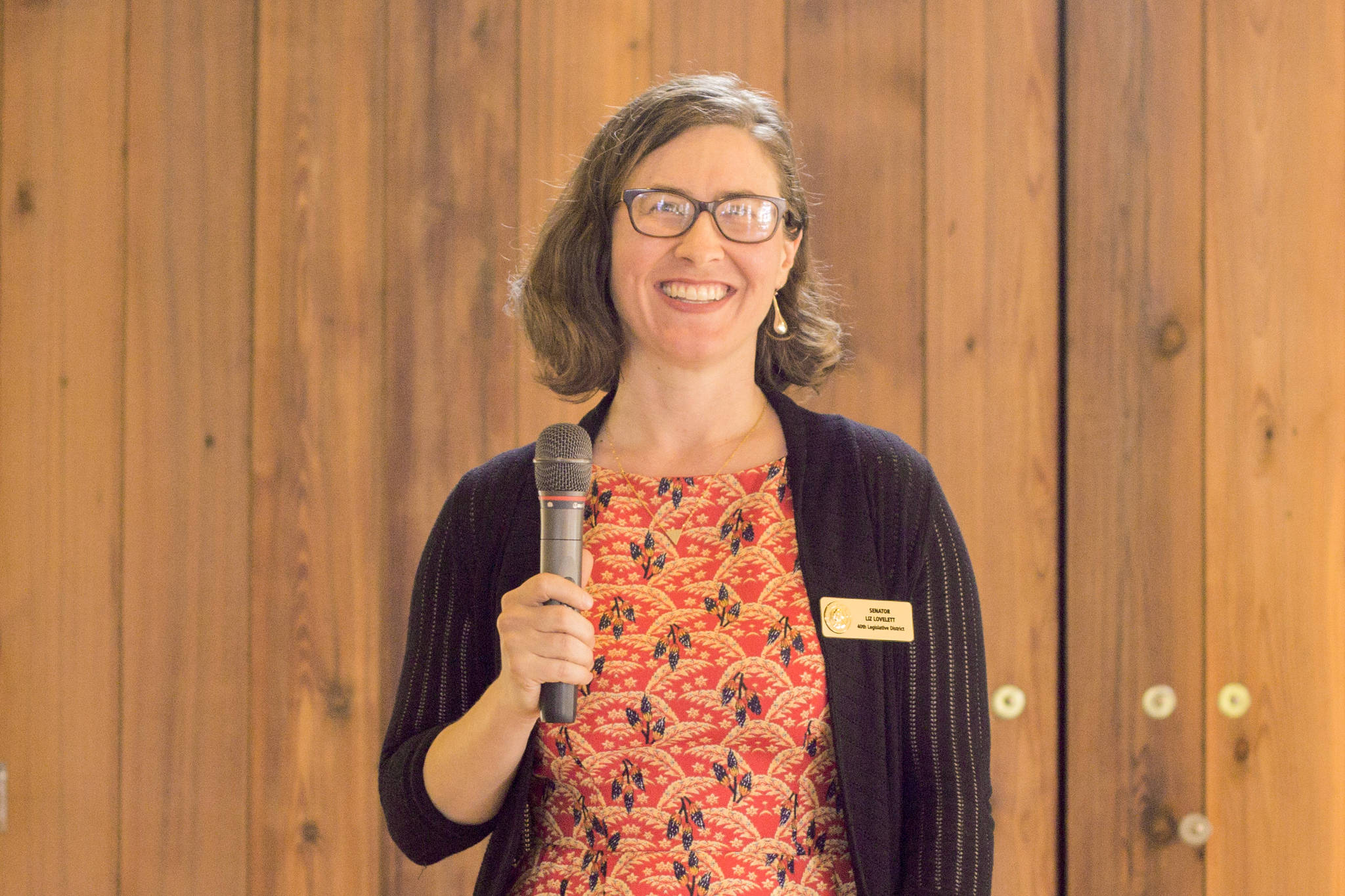Sen. Liz Lovelett visited San Juan and Orcas islands for the first time since she took office. On Saturday, May 4, Lovelett met with constituents at Brickworks in Friday Harbor and visited Orcas on Sunday, May 5, speaking at Moran and the Orcas Women’s Coalition quarterly meeting.
Her talks included information about the budget, climate change and the Southern resident orcas.
“So far it has been thrilling to be in Olympia,” Lovelett said in Friday Harbor, adding that the 40th district is incredibly engaged. “That helps me do my job better. So I know that when I go to the table and have the opportunity to advocate for people of the 40th, I know what you think. … I do love getting out into the community.”
On April 28, Lovelett concluded her legislative session as a state senator since being appointed following the resignation of Kevin Ranker in January. Ranker’s departure occurred just three days before hearings began.
“So far it has been thrilling, to say the least, in Olympia. It’s a very good fit for the goals I have and things I’d like to achieve for the people and environment of Washington state,” Lovelett said.
Legislature passed 485 bills this session, Lovelett said, that’s about twice as many as the average amount of bills that are passed.
“This was pretty historic legislation that I got to get on,” Lovelett said.
Budget
It was a successful session for passing progressive funding allocations to environmental, mental health and social programs, according to Lovelett. One project she said she was especially proud of having a hand in was securing $1 million for Friends of Lopez Island Pool could build the county’s first public swimming pool on Lopez. She added that San Juan County was one of two in the state without a public pool.
“I was thrilled to work on that,” Lovelett said.
Included in the budget, Lovelett said with enthusiasm, is funding for a new 144-car hybrid electric ferry as well as the conversion of two existing ferries on the fleet. Washington State Ferries was allocated $990,000 for planning work to prepare for hybrid-electric vessel terminal charging docs at Mukilteo and Seattle. An additional $160,000 was allocated to a vessel noise-reduction study.
Lovelett said that the transportation budget was heavily affected in the 1990s by the introduction of $30 car registration tabs.
“That decimated our transportation budget and we’ve been rebuilding it since,” Lovelett said, encouraging everyone to vote against the initiative in November when it’s on the ballot.
One of the pieces of legislature passed this session, Lovelett explained, was a progressive real estate excise tax instead of a flat percentage for everyone. Currently, the REET is 1.28 percent across the board. The new rate varies depending on the cost of the property; 1.1 percent for properties $500,000 and less; it remains 1.28 percent for properties $500,001 to $1.5 million; it increases to 2.75 percent for sales of $1.5-$13 million; and anything more than $3 is taxed at 3 percent.
“We’re trying to really target the taxes in the places that can most afford it and fix some tax relief to the people can least afford it,” Lovelett said. “I was pretty pleased. I didn’t know going in that we were going to get any of these things out the door.”
Because of the state’s constitution, an income tax cannot be established in Washington unless ⅔ of the House and Senate vote to eliminate the caveat. Lovelett said that Legislature was able to pass a 58 cent on $100 of income to go toward a Washington state fund for retirees to access when the time comes.
“It’s a state safety net [for Social Security],” Lovelett said.
Climate Change
“It’s really interesting to work in a climate that only half the people believe in [climate change],” Lovelett said.
If climate change is a death by 1,000 cuts, then the solution is a healing with 1,000 band-aids, Lovelett explained. She said she was astonished by the bills that didn’t make it through legislation — a plastic bag ban and straw restrictions both died along the way.
A fantasy of hers, Lovelett continued, was to have a machine that converts marine plastics into fuel. She said she was pleasantly surprised to learn that is already a real option and hopes that it can be embraced and utilized in the future.
Lovelett also said she is impressed with the cogeneration model Denmark has, where one company’s waste is another’s treasure. She referenced the creation of windmill parts that happen in Anacortes, which leaves behind large amounts of scrap metal that could likely be used in some other industry.
“Never underestimate the power of your voices to get things done,” Lovelett said.
Southern residents
Gov. Jay Inslee’s Southern Resident Killer Whale Task Force provided 36 suggestions to the governor on how to attack the dire orca situation. A handful of those suggestions required legislative action.
“We had a lot of focus this session on Orca recovery,” Lovelett said. “Which I know is as hugely important to the San Juans as it is to a lot of the rest of the state. But particularly because you guys see it with your own eyes.”
Legislature passed every orca-centric bill that was presented this year and they were signed into law by Inslee on May 8. That legislation included ESHB 1578, which was sponsored by Rep. Debra Lekanoff, D-Bow, which reduces threats to Southern resident orcas by improving the safety of oil transportation; 2SHB 1579 by Rep. Joe Fitzgibbon, D-Burien, which implements the recommendations of the Southern Resident orca task force related to increasing Chinook abundance; 2SSB 5577 by Sen. Rolfes, D-Bainbridge Island, which concerns the protection of Southern Resident orcas from vessels; SB 5918 by Lovelett, which provides whale watching guidelines in the boating safety education program; and SSB 5135, also by Rolfes, which prevents toxic pollution that affects public health or the environment.



